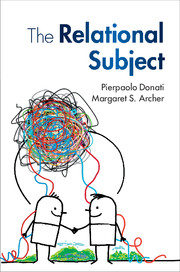Book contents
- Frontmatter
- Dedication
- Contents
- List of figures
- Acknowledgements
- Part I
- Part II
- Part III
- Prologue: The range of Relational Subjects: where and how they emerge
- 6 When Relational Subjects generate relational goods
- 7 The emergence of collective Relational Subjects and their societal impact: beyond the market/state binary code
- 8 Relational Subjects and the ravages of globalized markets: the need for subjects with relational ethics
- 9 Conclusions: Collective subjects and the added value of social relations
- Index
8 - Relational Subjects and the ravages of globalized markets: the need for subjects with relational ethics
from Part III
Published online by Cambridge University Press: 05 July 2015
- Frontmatter
- Dedication
- Contents
- List of figures
- Acknowledgements
- Part I
- Part II
- Part III
- Prologue: The range of Relational Subjects: where and how they emerge
- 6 When Relational Subjects generate relational goods
- 7 The emergence of collective Relational Subjects and their societal impact: beyond the market/state binary code
- 8 Relational Subjects and the ravages of globalized markets: the need for subjects with relational ethics
- 9 Conclusions: Collective subjects and the added value of social relations
- Index
Summary
The problem: the moral responsibility for market outcomes ‘at a distance’
Let us start by identifying the problem. A huge literature has demon- strated that the globalization of economic markets is producing widespread ravages all over the world, in terms of the appearance of new inequalities, pauperization processes, and attacks on human rights in many parts of the globe. We ask ourselves: who is responsible for the harm that one or more market agents/actors bring to bear on distant others in an impersonal and unintentional way? The ‘others’ can be single individuals, vast social groups, and even entire populations.
A question like this becomes more and more relevant in so far as the capitalist economy becomes fully globalized. The issues of agents/actors' morality in the era of globalization cannot be dealt with by traditional ethical norms.
Traditional ethics claims that moral responsibility can be direct, indirect, or adiaphoric.
It seems relatively easy to identify direct moral responsibility when, for example, a financial trader directly sells tainted financial products without informing clients of the elevated risk of loss, or when the owner of a sweat shop exploits underage or female workers, violating basic human rights. In these cases, Ego inflicts direct harm on Alter, who is a proximal (near) person, which does not exclude the possibility of harm done to third parties as well.
But what can we say when economic action is undertaken with the intention of harming no one, yet causes negative effects? Take the example of the decision to move investments in order to create work and wealth in one location when this decision involuntarily causes unemployment and poverty in other locations.
Traditional moral theory usually applies the principle of double effect (or the principle of the indirect volunteer).
- Type
- Chapter
- Information
- The Relational Subject , pp. 263 - 300Publisher: Cambridge University PressPrint publication year: 2015

